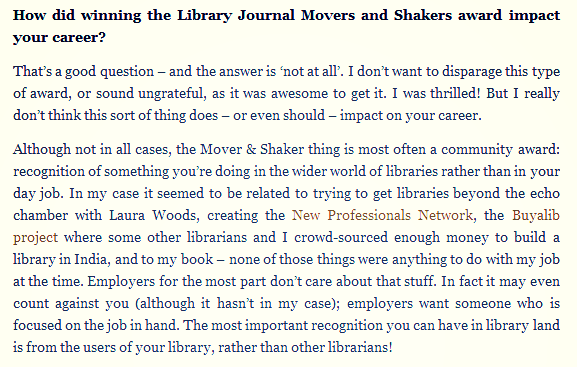It was a Customer Services role at the University of Leeds: back then I was fine with the term 'customer' in a library context, actively pleased about it in fact, and right away my Dad began the process of helping me understand how wrong I was... I had no intention to stay in library work - it was a temporary measure, and I wasn't even first choice for the job: I'd been interviewed months earlier and was first reserve for if anything came up! But it turned out to be about a million times more interesting than I expected, so I stuck around. (There's more on my library roots here. Remember the Library Routes Project? That was great. The wiki has gone but you can still find people's blog posts about how they got into this profession.)
A lot has happened to the industry and the profession in the last 10 years (there are many fewer libraries open, for a start), and there are people who'd be much better at documenting it than me. One thing I think we can all agree on is that the profession has become much more fragmented. There are many groups and sub-groups and splinter groups, and we don't speak with one voice very often. This is undoubtedly sad, but it's also completely inevitable.
People tend to regress towards the mean, by which I mean most of us see what's normal and that at least influences our thinking. The great thing about social media and the connected world is that there are so MANY means, so many normals - everyone can find their tribe. (This, of course, has its downsides in the wider context - idiots and hateful people can find other idiots to legitimise their hate. But that's not what this post is about.) So if you have a set of views, and you find others who share them, then you can DEVELOP those views rather have your rough edges smoothed off and your rebellion derailed... So I don't think we can really bemoan our fragmented profession - in a way it should always have been like this, but people couldn't find each other so easily before. Views and voices were more homogenised than they are now. It's true it would be easier to get things done if we all felt the same and agreed on everything - but given that isn't going to happen, we can all make progress on a local level, making our services the best they can be, and contributing to our communities in meaningful ways.
Over the last 10 years I've fallen in and out of love with various library organisations, I've said and done some things I'm proud of and some I cringe when I remember, and I've had amazing experiences I could never have predicted. The constant through all this has been the people - librarians are, for the most part, a magnificent community to be a part of. We are supportive. We share things. We talk openly about failures so others can learn from them, and we don't closely guard our successes so others can benefit from them too. We build meaningful networks online and in person and help each other get things done.
Of course there are exceptions to this happy picture, but that's the case in any large group of people. The trick is to work out who needs to blend into the background noise, and who might be on to something useful that can change the way you think...
If you read this blog, or are / have been part of my Twitter network, or if I've chatted to you at conferences or via email, thank you for helping shape my views and experiences over the last 10 years.


















